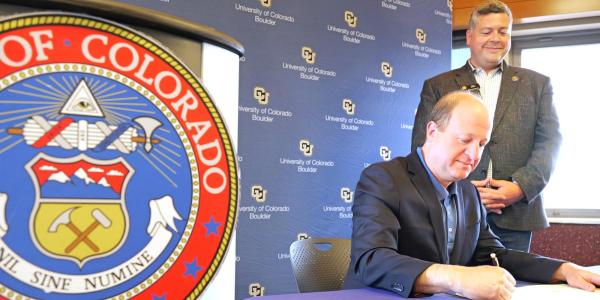Robert McDonald, dean of University Libraries and senior vice provost for online education, an innovator, testified remotely before the New York City Council Committee on Higher Education on a new model of online education where students can start a degree without the traditional admissions processes. The hearing, titled Online Degree Programs: Past, Present, and Future, was held to collect evidence on the value of online learning programs to advise the City University of New York.

Dean Robert McDonald testifies remotely before the New York City Council Committee on Higher Education, Sept. 22, 2022.
In a traditional master’s degree program, students typically go through a rigorous application process that might include an essay, references and transcripts demonstrating high performance in a related degree program. Students who are admitted to the program may wait for months to start classes.
Such an application process favors students with resources such as time and money and disadvantages those from non-traditional backgrounds. McDonald is working to change this.
On Sept. 22, McDonald testified on an innovative online education model that is now offered for some graduate programs at CU Boulder. Three courses—MS in Electrical Engineering, MS in Data Science, and ME in Engineering Management—are offered through the Coursera platform, and all of them confer successful students with a master’s degree that is identical to any master’s degree conferred at CU Boulder.
“It was exciting to share our experience pioneering online degree programs that meet the needs of a broader range of students, including those who are working professionals, caregivers, those who need to jump-start their careers immediately, and those from financially disadvantaged backgrounds,” McDonald said. “I hope other institutions can benefit from what we are learning, because online education promises to open a world of opportunity to people across the globe.”
A major difference between these online courses and traditional residential master’s programs is that the admissions process is performance-based. Students can take the required classes through the Coursera platform to see if they can pass, and then, if they wish, pay the tuition fee required to earn the full credit toward the degree. Such a process removes the financial risk students face entering a master’s degree program, where ordinarily they may not be able to fully recover their fees if they cannot pass the classes.
Whereas residential master’s programs typically start once a year, online programs have classes starting every six weeks. Students who want to learn new skills immediately to support career growth are not delayed.
“Our performance-based degree programs are all taught by our faculty from the University of Colorado Boulder, but they are highly automated and supported by our course facilitators, who are often teaching assistants in those programs,” McDonald said. “This has enabled us to create all three of these programs at a lower cost to the student: $20K for the entire degree program. This was accomplished through faculty pushing hard for innovation in these degree programs, as well as a partnership with the scaled MOOC platform Coursera.”
Looking ahead, McDonald said the online education team at CU Boulder is working with partners in academic departments to offer more courses and degree programs and add innovations that further enhance the experience of online students.
“This is a new frontier in higher education that promises to provide quality education and opportunities for a greater range of students on a global scale, '' McDonald said. “I am very proud to be part of this effort.”
A recording of the Sept. 22 hearing can be found on the New York City Council website.



